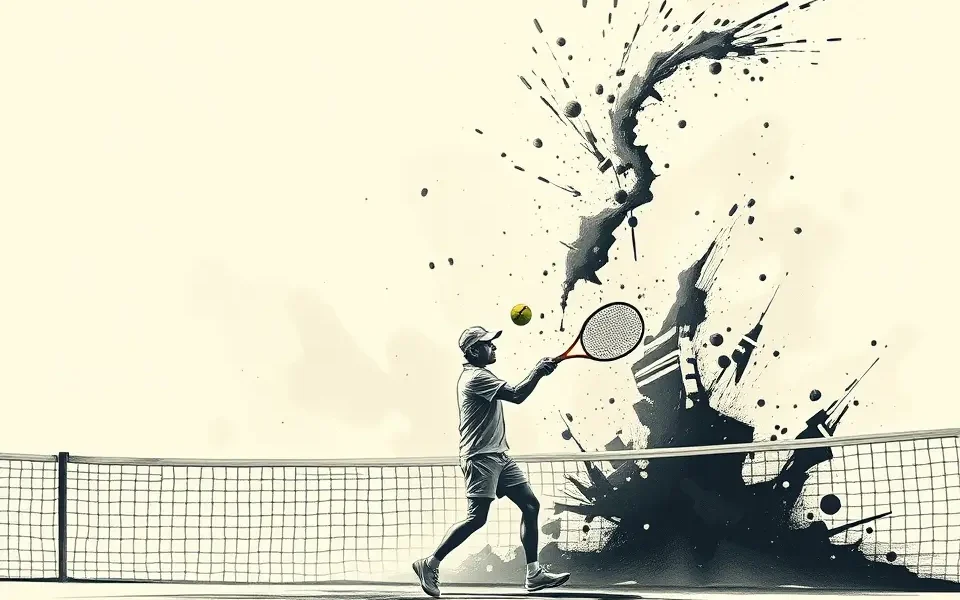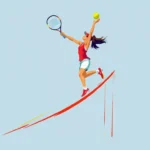Novak Djokovic, a name synonymous with tennis dominance, has long been celebrated for his exceptional return game. His ability to neutralize opponents’ serves and transition into offensive plays has been a cornerstone of his success. With a staggering 24 Grand Slam titles and a record-breaking 428 weeks as world No. 1, Djokovic’s return prowess has set him apart, even drawing comparisons to legends like Andre Agassi and Roger Federer. However, recent statistics paint a concerning picture, suggesting a decline in this once-dominant aspect of his game. Is this a temporary blip or a sign of a more significant shift in the Serbian champion’s career?
The Numbers Don’t Lie: A Statistical Dive
Historically, Djokovic has consistently ranked among the elite returners in the sport. His career statistics showcase his remarkable ability to win 55.1% of second serve return points and convert 44.1% of break points, figures that placed him seventh on the all-time ATP list for return ratings. However, a closer look at his performance over the past year reveals a noticeable decline.
Plunging Return Ratings Against Top Players
The most alarming trend is the significant drop in Djokovic’s return rating against top-10 opponents. His percentage of return games won against this elite group has plummeted from 25.4% throughout his career to a mere 13.1% in the last 52 weeks. This drastic reduction highlights a struggle against the very best in the game, raising concerns about his ability to maintain his competitive edge.
The decline isn’t limited to top-10 opponents alone. Djokovic’s return rankings against top-20 and top-50 players have also witnessed a dip, further emphasizing the challenges he faces in his return game.
Break Point Conversion Woes
Another key indicator of Djokovic’s declining return game is his break point conversion rate. While he boasts an impressive career average of 44.1%, this number has fallen to 41.4% more recently. This may seem like a small change, but in the high-pressure environment of professional tennis, even a marginal decrease can be the difference between winning and losing crucial matches.
Serve’s Up: A Silver Lining?
Interestingly, while Djokovic’s return game has struggled, his serve has shown signs of improvement. Over the past year, his serve ratings have climbed, elevating him from 26th to 10th place. This suggests that Djokovic may be compensating for his return struggles by focusing on strengthening his serve, aiming for more dominant service games and easier holds.
However, can a stronger serve alone offset the impact of a declining return game against the world’s top players?
Factors Behind the Decline: Age, Strategy, or Competition?
Several factors could be contributing to Djokovic’s struggles in his return game:
- Age: At 37, Djokovic is entering the twilight of his career. While he remains in exceptional physical condition, age inevitably takes its toll, potentially affecting his reaction time and agility – crucial elements for a world-class return game.
- Strategic Shifts: Opponents may have adjusted their serving strategies to exploit perceived weaknesses in Djokovic’s return game. By varying their serve placement, spin, and pace, they could be disrupting his rhythm and preventing him from dictating rallies from the return.
- Increased Competition: The Next Gen of players, such as Carlos Alcaraz and Jannik Sinner, possess powerful serves and aggressive baseline games. Their relentless pressure and ability to consistently hit their spots may be making it harder for Djokovic to impose his return game.
- Mental Factors: Djokovic’s mental fortitude has always been a significant asset. However, any dip in confidence or increased pressure to maintain his dominance could be subtly affecting his performance on the return.
A Temporary Setback or a Sign of Things to Come?
The question remains: is this decline in Djokovic’s return game a temporary setback or a more permanent trend? While it’s difficult to say for certain, several factors suggest that Djokovic still has the potential to bounce back:
- Proven Track Record: Djokovic’s unparalleled career achievements demonstrate his ability to adapt and overcome challenges. He has consistently reinvented his game throughout his career, and he may be able to find new strategies to revitalize his return game.
- Unwavering Dedication: Djokovic’s commitment to training and self-improvement is legendary. He is constantly seeking ways to refine his technique and enhance his physical and mental conditioning. This relentless pursuit of excellence could help him regain his return prowess.
- Experience and Mental Fortitude: Djokovic’s vast experience and mental toughness provide him with a significant advantage over his younger rivals. He has a proven ability to perform under pressure and rise to the occasion in crucial moments.
- Coaching Changes: With his separation from coach Ivanisevic in March 2025, the effect of this on his serve and return game remains to be seen.
The Road Ahead: Reclaiming the Return Throne
As Djokovic navigates this challenging phase in his career, the tennis world eagerly anticipates whether he can reclaim his return game prowess and maintain his dominance in the sport. To do so, he may need to:
- Refine His Return Technique: Experimenting with subtle adjustments to his stance, footwork, and swing path could help him generate more power and accuracy on his returns.
- Improve His Anticipation and Reaction Time: Focused training drills and mental exercises could sharpen his ability to anticipate serves and react quickly to different types of spin and pace.
- Develop New Return Strategies: Adapting his return positioning and employing more aggressive or defensive tactics could disrupt opponents’ serving patterns and create more opportunities to attack.
- Maintain Mental Fortitude: Cultivating a positive mindset and maintaining unwavering belief in his abilities will be crucial for overcoming challenges and regaining his confidence on the return.
Conclusion: The King’s Next Chapter
Novak Djokovic’s recent struggles in his return game have undoubtedly raised concerns among fans and analysts alike. However, it’s important to remember that even the greatest champions face challenges and periods of adversity. With his unparalleled track record, unwavering dedication, and mental fortitude, Djokovic has the potential to overcome this hurdle and reclaim his status as the king of the return. Only time will tell if he can successfully navigate this transition and continue to add to his already legendary career. The tennis world will be watching with bated breath as he embarks on this next chapter.








No Comment! Be the first one.